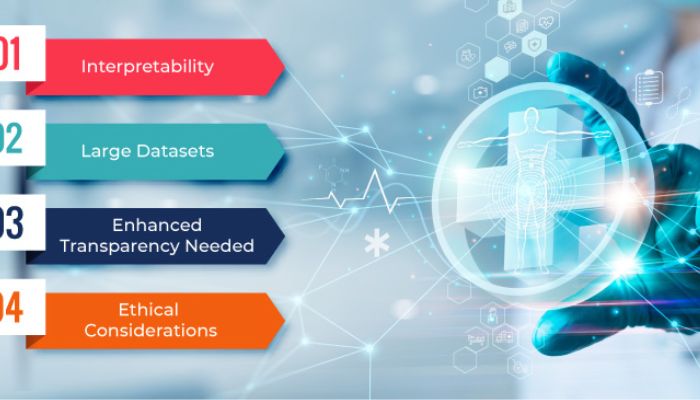The amazing technology called generative AI, which can make completely new data, has the potential to completely change the way healthcare is provided. A lot of different things can be done with it, from finding new drugs to making personalised medicines. Despite this, there are some problems with this cutting-edge field that make it hard for many people to use. Let’s know more about “what are challenges for Generative AI in Healthcare?”.
Generative AI in Healthcare: A Boon with Brambles
Hurdles on the Road to Revolution
A lot of interesting things can happen with generative AI, but there are some big problems that need to be fixed:
1. Data Security and Privacy
Data protection and privacy are very important because generative AI needs a lot of patient data to work at its best.
- Breakouts: Cyberattackers love to go after large datasets that hold private medical data. Trust in the technology could be lost if there are breaches, which could have terrible effects on people.
- Balancing Usefulness with Anonymity: Analysing data can make it less useful for creating AI models. Finding a balance between usefulness and anonymity is important. For patients’ privacy, it is very important to find the right mix between data use and data retention.
2. Algorithmic Bias
The information that AI models are taught on is what makes them good. Artificial intelligence (AI) can make biassed results if the data it uses for training has flaws in it.
- Unequal Treatment: AI that is biassed could cause different types of patients to not get the same care. AI used for detection, for instance, might miss some conditions that are more common in some groups of people.
- Mitigating Bias: To reduce bias, you need to carefully choose the data you use and keep an eye on the AI’s results to find and fix any trends that are unfair.
3. Lack of Interpretability
Sometimes, generative AI models are so complicated that it’s hard to figure out how they get to the results they exhibit. Concerns are raised about this lack of interpretability because:
- Accountability: Who is responsible if a suggestion made by AI results in a bad outcome? In order to make smart choices, healthcare professionals need to know why AI makes particular suggestions.
- Building Trust: A patient is less likely to trust healthcare choices made by AI if they don’t understand why those decisions were made. To build trust and make sure patients accept you, you need to be open and honest.
4. Regulatory Uncertainty
According to analyticsinsight, AI in healthcare is still being regulated in a more or less fluid way. Regulatory gaps make it hard for coders to plan ahead and stop new ideas from coming up.
- Defining Responsibility: To figure out who is responsible for the results of generative AI models used in healthcare situations, we need clear rules.
- Ensuring Safety and Efficacy: Safety and effectiveness must be ensured. Tough safety and effectiveness standards must be met by AI-powered solutions before they can be widely used.
Also Read: Critical Telegram Vulnerability Exposed- Is Your Telegram Account at Risk?
Conclusion: A Future Full of Potential
Generated AI has a huge potential to change healthcare, even with these problems. The healthcare sector can tap into the full potential of this technology by addressing concerns about data privacy, reducing algorithmic bias, focusing on interpretability, and following a clear set of rules. Germinative AI has the potential to become a strong tool for improving patient care, drug discovery, and the general efficiency of healthcare as research moves forward and ethical concerns are raised. I hope you enjoy reading “what are challenges for Generative AI in Healthcare?’.
Disclaimer: You should not take the information in this piece as financial advice. It is just for your information. Think about what you’ve learned and talk to a qualified financial advisor before you make any investment choices.







